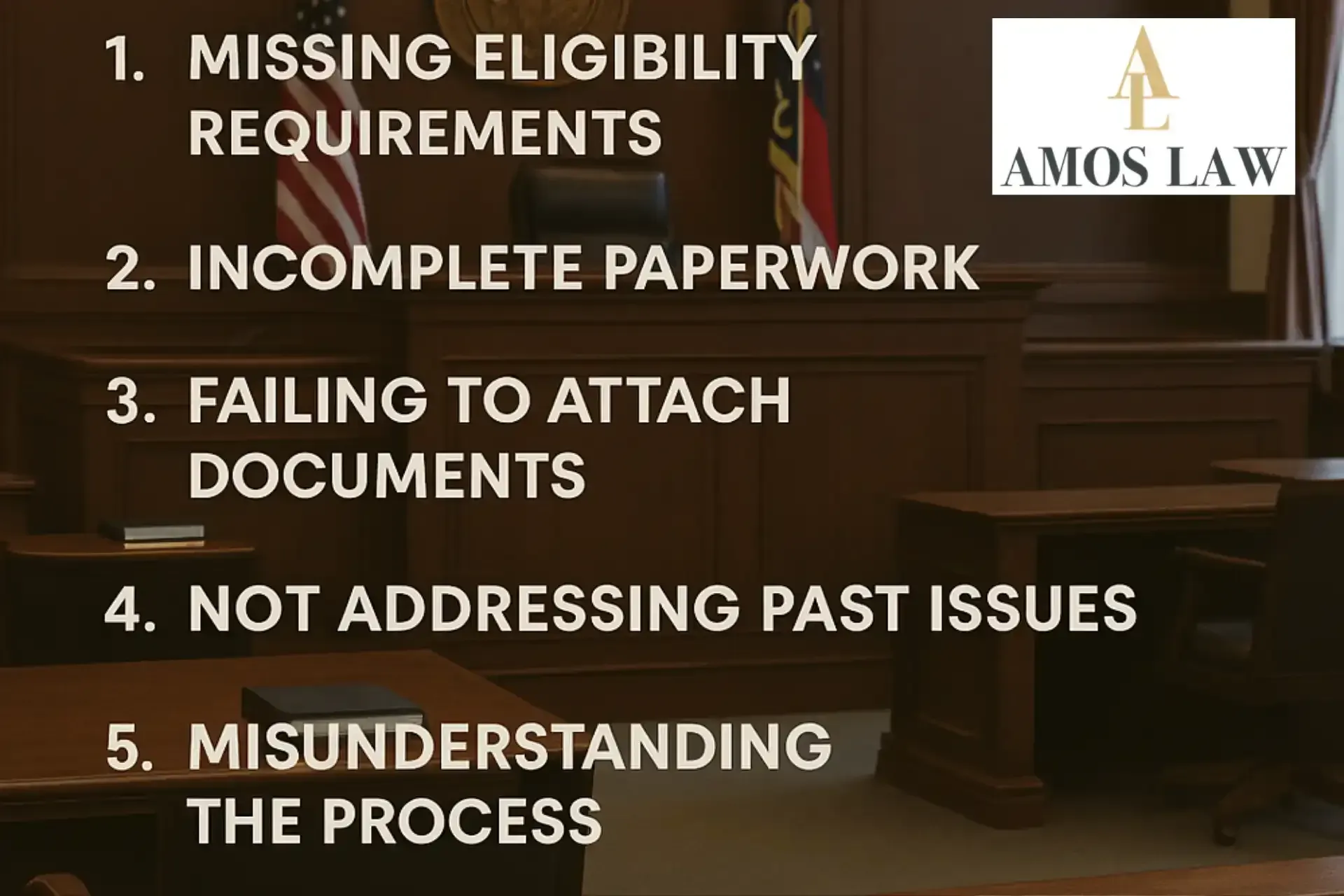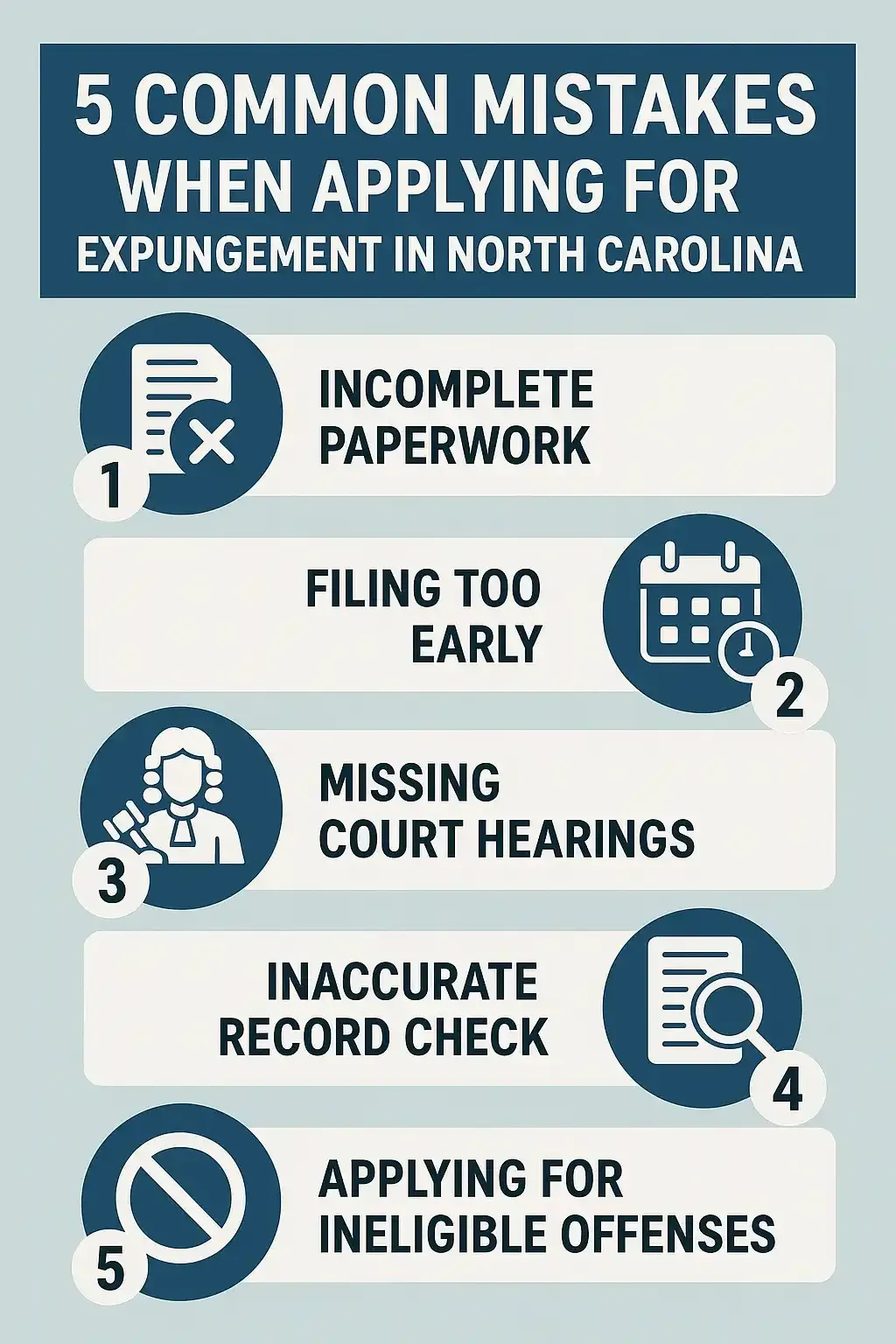Avoid These 5 Common Mistakes When Applying for Expungement in North Carolina

A criminal record can create long-lasting barriers to employment, housing, and education. Fortunately, North Carolina’s expungement laws—particularly under the Second Chance Act—offer individuals an opportunity to clear their records and move forward. However, the expungement process in NC is complex, and even minor errors can lead to delays or denials.
This guide highlights the 5 most common mistakes people make when applying for expungement in NC and provides actionable advice to avoid them. Whether you're seeking to expunge a misdemeanor, felony, or dismissed charge, understanding these pitfalls can significantly improve your chances of success.
1. Failing to Meet Eligibility Requirements
One of the most frequent reasons for expungement denials in North Carolina is applying when ineligible. NC expungement laws have strict criteria based on:
- Type of offense: Only certain nonviolent misdemeanors and felonies qualify. DWI convictions cannot be expunged, only dismissals or acquittals.
- Waiting periods:
- 5 years for a single nonviolent misdemeanor.
- 7 years for multiple nonviolent misdemeanors.
- 10 years for a nonviolent felony.
- Outstanding obligations: Unpaid restitution, court fees, or active probation disqualify applicants.
How to Avoid This Mistake:
- Verify eligibility by reviewing NC General Statutes § 15A-145 to § 15A-149 or consulting legal resources.
- Ensure all fines, probation, or community service are completed before applying.
2. Filing Incorrect or Incomplete Paperwork
The NC expungement process requires precise documentation. Common filing errors include:
- Using the wrong AOC form (e.g., AOC-CR-279 for dismissals vs. AOC-CR-225 for fee waivers).
- Missing affidavits: Some petitions require notarized statements of good moral character from non-relatives.
- Incomplete criminal records: Failing to disclose all charges (even dismissed ones) can result in denial.
How to Avoid This Mistake:
- Download the correct forms from the NC Administrative Office of the Courts.
- Double-check that all sections are filled out and notarized where required.
- Submit one petition per county if charges span multiple jurisdictions.
3. Ignoring Waiting Periods and Deadlines
Many applicants mistakenly file before their waiting period ends or let certificates of eligibility expire. Key timelines include:
- 180–210 days for automatic expungement of dismissed charges under SB 565.
- 1-year validity for eligibility certificates, after which you must reapply.
- 6–12 months for processing, with delays if paperwork is incomplete.
How to Avoid This Mistake:
- Mark your calendar for the waiting period end dates.
- Follow up with the clerk’s office if you don’t receive updates within 8–12 months.
4. Assuming Expungement Erases All Records
A granted expungement in North Carolina removes records from government databases, but:
- Private background check companies may still display mugshots or arrest details.
- Federal and out-of-state records are unaffected.
How to Avoid This Mistake:
- After approval, request removal from private databases citing NCGS § 15A-152.
- Keep a copy of your expungement order to dispute incorrect background checks.
5. Not Seeking Assistance
While you can file pro se, the NC expungement process involves:
- Multiple agency reviews (SBI, DA, courts).
- Potential hearings, especially for felony expungements.
- Complex statutes that change frequently (e.g., Second Chance Act expansions).
How to Avoid This Mistake:
- Seek guidance from organizations like Legal Aid of NC or specialized firms.
- A legal professional can navigate county-specific rules and correct errors before submission.

Why Choose Amos Law for Your NC Expungement?
At Amos Law, we understand how a criminal record can hinder your future. Our team provides personalized guidance through every step of the expungement process in North Carolina, from eligibility checks to post-approval record updates. We stay updated on Second Chance Act changes and county-specific filing requirements to maximize your chances of success.
If you’re ready to clear your record, contact us today for a consultation. Let us help you secure the fresh start you deserve.
FAQs About Expungement in North Carolina
1. How much does expungement cost in NC?
- $175 for convictions (waivable for financial hardship).
- No fee for dismissals or acquittals.
2. Can I expunge a felony in NC?
Yes, if it’s a nonviolent felony and 10+ years have passed since sentencing.
3. How long does expungement take?
Typically 6–12 months, depending on county backlog.
4. Will expungement restore my gun rights?
No. Federal law still prohibits firearm possession for certain convictions.
5. Do I need a hearing for expungement?
Sometimes. Dismissals usually don’t require one, but felony expungements might.
Final Thoughts
Avoiding these 5 common expungement mistakes can save you time, money, and frustration. By verifying eligibility, filing accurately, and seeking assistance when needed, you can successfully navigate North Carolina’s expungement laws and move forward with confidence.
For more information, visit Amos Law or explore our step-by-step expungement guide.



